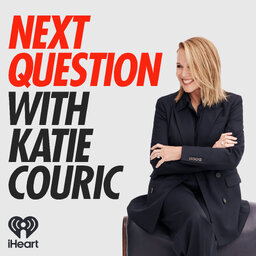Entering the Comfort Zone: Breast Cancer Awareness and Research with Easy Spirit
In this special live recording of Next Question in New York City at the Paley Center for Media, Katie Couric enters her "Comfort Zone" for a powerful conversation in honor of Breast Cancer Awareness Month, in partnership with comfort footwear brand, Easy Spirit! Katie shares her personal experience as a breast cancer survivor alongside the surgeon who treated her, renowned breast cancer researcher Dr. Lisa Newman. They are joined by Sharon Joseph, CEO of the Boys and Girls Club of Harlem, who is currently undergoing treatment for breast cancer herself. Together, they discuss their personal journeys, the importance of early detection, and the groundbreaking research funded by Marc Fisher’s Easy Spirit.
 Next Question with Katie Couric
Next Question with Katie Couric


